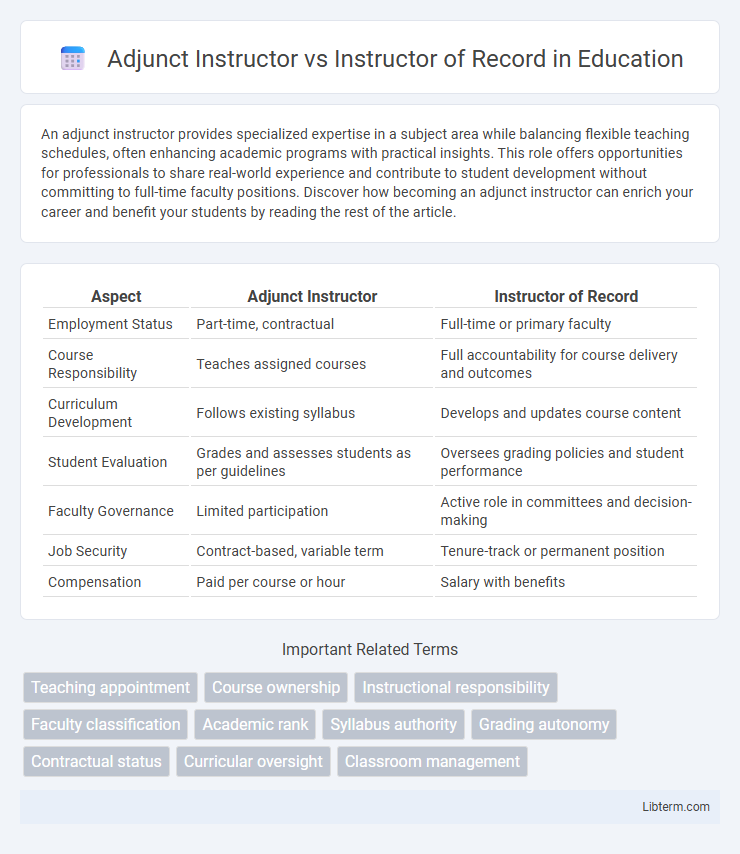An adjunct instructor provides specialized expertise in a subject area while balancing flexible teaching schedules, often enhancing academic programs with practical insights. This role offers opportunities for professionals to share real-world experience and contribute to student development without committing to full-time faculty positions. Discover how becoming an adjunct instructor can enrich your career and benefit your students by reading the rest of the article.
Table of Comparison
| Aspect | Adjunct Instructor | Instructor of Record |
|---|---|---|
| Employment Status | Part-time, contractual | Full-time or primary faculty |
| Course Responsibility | Teaches assigned courses | Full accountability for course delivery and outcomes |
| Curriculum Development | Follows existing syllabus | Develops and updates course content |
| Student Evaluation | Grades and assesses students as per guidelines | Oversees grading policies and student performance |
| Faculty Governance | Limited participation | Active role in committees and decision-making |
| Job Security | Contract-based, variable term | Tenure-track or permanent position |
| Compensation | Paid per course or hour | Salary with benefits |
Introduction to Adjunct Instructor vs Instructor of Record
An Adjunct Instructor typically teaches specific courses on a part-time basis without full-time faculty status, contributing specialized expertise and flexible scheduling. An Instructor of Record holds primary responsibility for a course's academic content, assessment, and compliance with institutional standards, often ensuring consistency and quality in student learning outcomes. Understanding the distinction clarifies roles in curriculum delivery and faculty governance within higher education institutions.
Defining Adjunct Instructor and Instructor of Record
An Adjunct Instructor is a part-time faculty member hired to teach specific courses without full-time employment benefits or tenure, often bringing real-world expertise to the classroom. An Instructor of Record holds primary responsibility for course content, student assessments, and adherence to academic policies, typically as a full-time faculty member or contracted lead instructor. The Instructor of Record ensures academic standards and is accountable to the institution for course delivery and student outcomes.
Key Responsibilities of Adjunct Instructors
Adjunct Instructors primarily deliver course instruction, develop lesson plans, and assess student performance within a specific subject area. They often manage classroom activities, grade assignments, and provide feedback while adhering to the institution's curriculum guidelines. Unlike Instructors of Record, Adjunct Instructors typically do not handle administrative duties or curriculum development beyond their assigned courses.
Primary Duties of Instructors of Record
Instructors of Record hold primary responsibility for course development, delivery, and assessment, ensuring academic standards are met in accordance with institutional policies. They oversee student evaluations, assign grades, and maintain accurate records, serving as the official point of accountability for the course's integrity and outcomes. Adjunct Instructors may assist in teaching but typically do not carry the full scope of administrative and evaluative duties attributed to Instructors of Record.
Differences in Academic Authority
An Adjunct Instructor typically holds limited academic authority, often responsible for teaching specific courses without involvement in curriculum development or academic policymaking. In contrast, an Instructor of Record possesses full academic authority, overseeing course design, grading standards, and adherence to institutional academic policies. This distinction affects their roles in decision-making processes and accountability within the academic institution.
Contractual and Employment Differences
Adjunct Instructors typically work part-time on short-term contracts without guaranteed renewal, often lacking benefits such as health insurance or retirement plans, while Instructors of Record usually hold full-time or long-term positions with formal contracts ensuring job security and access to institutional benefits. Adjuncts frequently face lower pay scales and fewer opportunities for professional development compared to Instructors of Record, who possess greater academic authority and responsibility over course content and grading. Employment terms for Instructors of Record emphasize tenure or probationary periods, contrasting with the flexible, semester-to-semester agreements common to adjunct faculty.
Impact on Curriculum Development
Adjunct Instructors typically have limited influence on curriculum development, as their roles focus primarily on delivering established course content and grading assignments. In contrast, Instructors of Record often play a critical role in shaping curriculum, including designing syllabi, selecting course materials, and implementing academic standards. This difference significantly impacts the flexibility and innovation within academic programs, with Instructors of Record driving continuous improvement in course structure and learning outcomes.
Evaluation and Grading Authority
The Instructor of Record holds primary evaluation and grading authority, responsible for final course grades and academic integrity. Adjunct Instructors may conduct assessments and grade assignments but typically do not have ultimate decision-making power over final grades. Institutions often require the Instructor of Record to review and approve all grading conducted by adjunct faculty, ensuring consistent evaluation standards.
Career Advancement Opportunities
Adjunct instructors often face limited career advancement opportunities compared to instructors of record, who typically hold full-time positions with tenure-track potential and greater access to professional development resources. Instructors of record have increased responsibilities such as curriculum development and student assessment, enhancing their eligibility for promotions and leadership roles within academic institutions. Career advancement for adjuncts is constrained by part-time status and lack of institutional support, making transitions to permanent, full-time faculty positions more challenging.
Conclusion: Choosing the Right Academic Role
Selecting the right academic role depends on career goals and institutional requirements, with Adjunct Instructors often seeking flexible, part-time positions while Instructors of Record typically hold full responsibility for course delivery and grading. Institutions may favor Instructors of Record for long-term stability and curriculum development, whereas Adjunct Instructors enhance course offerings through specialized expertise. Understanding the distinctions helps educators align their professional aspirations with institutional needs and student success objectives.
Adjunct Instructor Infographic

 libterm.com
libterm.com